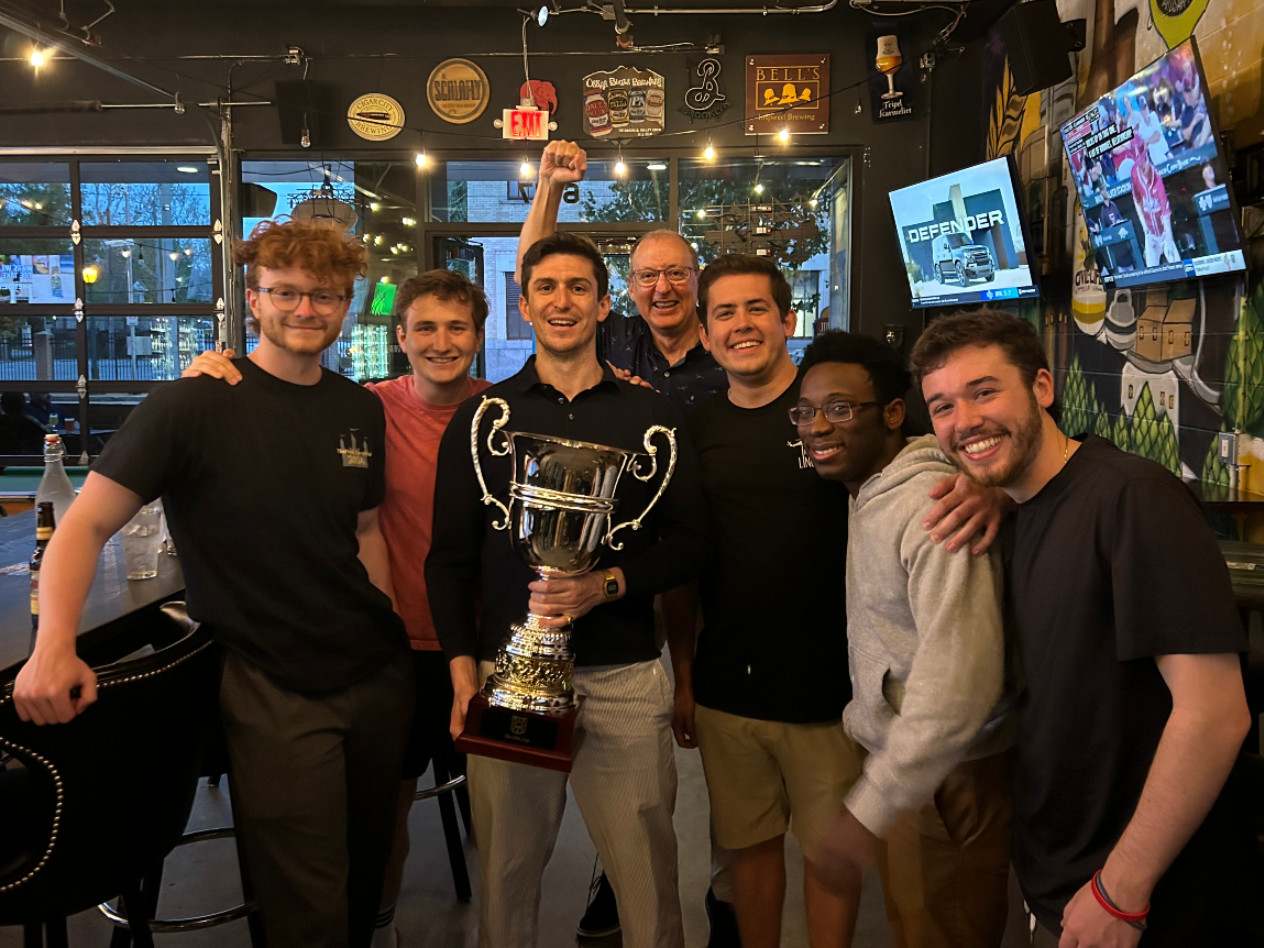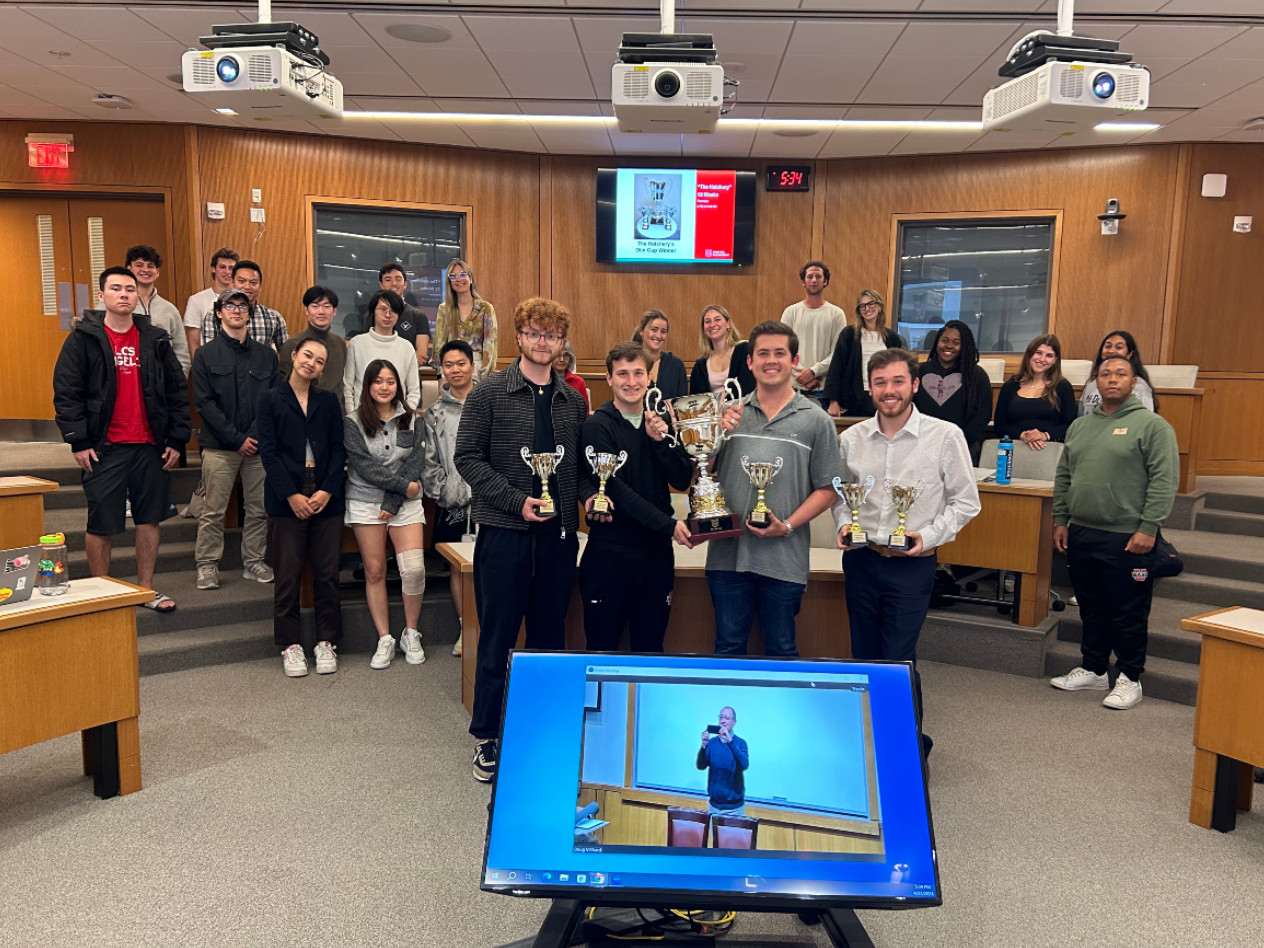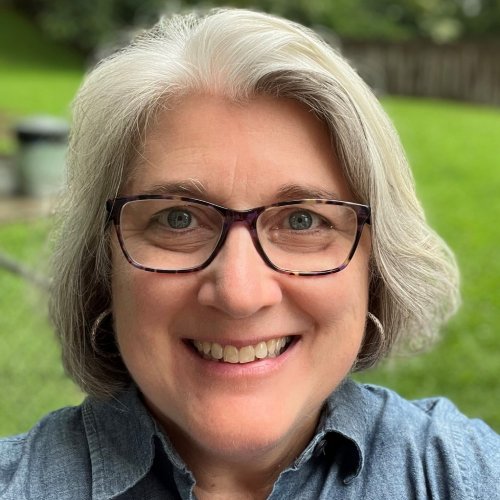Green startup Carbon Salary takes the Olin Cup
- May 6, 2024
- By Suzanne Koziatek
- 4 minute read

A startup aiming to leverage home energy improvement projects to create credits for the carbon offset market won the 2024 Olin Cup pitch competition.
The winner, Carbon Salary, was among seven teams that presented their pitches to a group of 60 judges—alumni and other members of the Olin community—during the
April 16 competition.
All were students in the Hatchery, a course taught by Doug Villhard, professor of practice in entrepreneurship and academic director for entrepreneurship. Students recruited team members to help build out their ideas and spent the semester developing and honing their business plans, said Rian Edwards, associate director for entrepreneurship.
“At the end of the semester, we have the Olin Cup—each student group gets 10 minutes to deliver a pitch, then answers questions from the judges,” Edwards said.
The final round pitted Carbon Salary against Portal, a company creating a mobile app that helps undecided students with career discovery through the use of short videos by professionals in various fields.
Carbon Salary prevailed, led by CEO Jake Hibbert, MBA 2025. Other team members include Jack Hobert AB 2025; Henry Goddard, BSCS 2024; Jake Madary, MArch 2024/MBA 2024; and Riley Thompson BSBA 2025. Pryce Adade-Yebesi served as entrepreneur-in-residence and mentored the team.
In their presentation, the Carbon Salary team explained how they plan to work with insulation companies and homeowners to measure and bundle the carbon emissions reduced by individual home insulation projects, turning those reductions into credits that can be sold to large corporations as carbon offsets.
Carbon Salary worked hard this semester to take a complex idea and boil it down to something both timely and simple: paying homeowners to improve energy efficiency.
Doug Villhard
“Nearly the night before the competition, they reduced their pitch down to one simple sentence and that's when we all knew they were on to something special," he said.
Helping companies get to ‘net zero’
Hibbert said the market for carbon credits is booming, as corporations look for ways to achieve “net zero”—mitigating their carbon emissions by purchasing credits from organizations that remove carbon in various ways.
His company would bring individual homeowners into this market by collecting information about carbon emission reductions achieved by their home insulation projects. “Anyone could sign up to my website after having done an insulation retrofit and send me their energy bills,” Hibbert said.
Carbon Salary would then document and quantify the reductions, sell that offset to a corporation, and reward the homeowner with regular payments. Hibbert noted that the process of getting these measurements certified is complex and expensive, putting it out of reach of an individual homeowner.
“If I do it on behalf of tens of thousands of homeowners, it spreads the cost of it among all of them,” he said. “This business really relies on volume.”
Hibbert and his Carbon Salary team are currently getting their company certified through Verra, the leading organization that enforces standards for measuring residential carbon emissions. They have a small proof-of-concept project underway with WashU’s Real Estate and Environmental Department, measuring the emissions from two sets of apartments—one with insulation improvements, one without.
“The big focus now is really nailing down how to measure the carbon offset, so that people know what they’re buying,” he said.
From seed to startup
Hibbert, a native of Scotland, came to Olin in September as part of the second cohort of entrepreneurship fellows. He said he doesn’t believe this project would have been possible without the support of WashU’s entrepreneurship ecosystem, citing such supports as the Skandalaris Center for Interdisciplinary Innovation and Entrepreneurship, the Hatchery, and the League of Extraordinary Entrepreneurs, a next-level course he plans to take in the fall.
“Because of the number of people who are here at WashU specifically for entrepreneurship, you have the opportunity to see people go through the process,” he said. “The Skandalaris Center has got an all-star team there—they’re passionate about what they do, and the center is phenomenally well-run and well-staffed.”
Hibbert also praised Villhard: “Doug is great at motivating and helping you. When you’re not quite sure what direction to take, he’s great at helping you choose a path.”
“All those pieces come together so I can take the seed of an idea out of the Hatchery class and turn it into something that may be a revenue-generating business by the end of the year—and it also could be great for the environment.”
The Olin Cup, which is sponsored by WashU Olin Business School and the Skandalaris Center, was founded in 1987. Villhard said the experience is an unforgettable one for those who win it.
“Think back on your own college experience. How much do you remember?” he said. “Winning the Olin Cup is a monumental achievement for entrepreneurial students that will remain on their resumes for years to come."
Photo: The Carbon Salary team and Professor Doug Villhard (center) celebrate the team’s win in the 2024 Olin Cup pitch competition.
The Olin Cup competition
The annual Olin Cup Competition has teams pitching their startup ideas to a group of judges.

Contact Us
For assistance in finding faculty experts, please contact Washington University Public Affairs.
Monday–Friday, 8:30 to 5 p.m.
Sara Savat, Senior News Director, Business and Social Sciences
314-935-9615
sara.savat@wustl.edu
Kurt Greenbaum,
Communications Director
314-935-7196
kgreenbaum@wustl.edu
